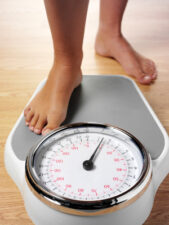 When did you last talk to your doctor about your weight?
When did you last talk to your doctor about your weight?
With so many methods for body acceptance and ways to lose weight now, doctors are being reminded to take the lead in helping their patients address and treat overweight and obesity and to fight the stigma that prevents many discussing this with their provider 1
What stigma?
According to Wiki a stigma can be defined as a mark of disgrace associated with a particular circumstance, quality or person. When a stigma is based on assumptions about a person being overweight, obese or having a high body fat percentage this can also be known as an anti-fat bias, fat shaming or fatphobia. 2
Body shaming may take the form of subjecting someone to humiliation and criticism for their bodily features and can also be extended to their looks, hair colour, tatoos, piercing, psoriasis, size of penis and breasts etc.1
It is also possible to engage in your own negative, fat-shaming self-talk e.g. “I feel so fat today”
It is true that social stigma of obesity does exist, and that overweight and obese people can experience fewer educational and career opportunities and on average earn a lesser income than ‘normal weight’ individuals. Feelings of stigma, can pose a barrier for people trying to access services as well as making it hard for those wanting to help. Ultimately this can leave affected people feeling even more isolated and vulnerable. 3
Diets alone can’t help
Obesity and overweight conditions are vast and complex health issues. Obesity is defined by the WHO as abnormal or excessive fat accumulation that may impair health.
It results from a sustained, positive energy balance in which excess calories are consumed, but exceed those being expended. This may lead to the assumption that fixing diet and increasing exercise will offer a cure. If only it were so easy!
Obesity is an increasing common problem not only to those with a genetic predisposition but also because the built environment that we live in makes it difficult for many people to eat healthily and do enough activity to aid weight loss. Issues such as employment, education, ethnicity, housing, household income v’s cost of living; accessibility to transport and food supply all play their part. The promotion of high energy, ultra- processed meals and snack through social media and TV advertising, as well as modern day society that places much emphasis on food and eating is also contributing to the problem. 4
Weight measurement and categories
There are two main ways to measure body weight
- Body Mass Index is a tool to relate weight to height for adults (18years and over). It is calculated by dividing weight (body mass) in kilograms or pounds by the square of a person’s height in metres.
| Category | Class | Risk | BMI Range |
| Healthy | 18.5-24.9 | ||
| Overweight | 25-29.9 | ||
| Obese | 1 | Low | 30-34.9 |
| Obese | 2 | Moderate | 35-39.9 |
| Obese | 3 | High | >40 |
Either side of the healthy BMI range, problems can occur. As BMI drops <18.5 kg/m2 ,
there is a greater risk of bone thinning, fatigue and immune insufficiency, and as BMI increases towards 25kg/m 2, the risk of diabetes, heart disease and diabetes rise.
Note: The BMI of children rapidly changes as they mature, and growth rates differ between boys and girls and so measurements of BMI need to be made using a ‘child growth reference’. Race and muscularity issues also need to be factored in 5
- Waist to hip
The WHO define abdominal obesity in men as a waist-to-hip ratio of at least 0.90 and 0.85 or more in women. This measurement helps to reflect the accumulation of intra-abdominal (visceral) fat and might be a better predictor than BMI of the risk of Type 2 Diabetes and hypertension in some communities.6
So how big is this problem ?
- Weight gain is a global issue but here in New Zealand between 2022-23, 67.7% % of adults and 38.8% of children were overweight or obese.7
- In 2022 it was estimated that 307,400 people in NZ had diabetes 8
- In 2020 it was estimated that around 103,000 people in New Zealand struggled with eating disorders.9 which helps to illustrate that there can be weight problems at both ends of the BMI Index
Living with obesity and overweight conditions
The greater the level of overweight and obesity the harder it becomes to treat because body functions change.
- On a daily basis overweight and obese people may experience a number of problems affecting their daily activities, mobility and quality of life which get harder to ignore with increasing age. Symptoms may include:
Breathlessness – increased sweating- snoring- difficulty doing physical activity- tiredness- joint
and back pain- low confidence and self- esteem and feelings of isolation.
This can take its toll on mental health causing depression and affecting relationships with family
and friends.
- Serious health risks associated with excess body weight include the development of:
Type 2 diabetes- high blood pressure & high cholesterol leading to heart disease- stroke- some
forms of cancer- asthma- metabolic syndrome-osteoporosis- gastrointestinal disease- -reduced
fertility, liver and kidney disease, sleep apnoea and complications in pregnancy etc.
Fear tactics don’t work
Knowing all these risks factors is not always a motivator and in fact can lead on to fear and anxiety with more excess eating and weight gain. 10
Working out how to offer help and treatment to break this cycle is one of the biggest challenges facing health professionals today.
Giving up on this discussion is not an option either because weight issues are placing a considerable burden on our health services, especially now that we have Covid 19 to consider. Having obesity is linked to impaired immune function and may triple the risk of hospitalization with covid 11
On an encouraging note, news has come from a study of people in Hong Kong with Type 2 diabetes who achieved a 10% reduction in body weight within their first year after diagnosis, they were not only able to mostly sustain their diabetes remission but this was also associated with a 31% decreased risk for all- cause morbidity 1
So what weight loss treatments are available?
Fad diets:
Forget the grapefruit or watermelon diet, Aitkins, F Plan, Beverley Hills, Israeli Army Diet etc or any diet that promises fast weight loss with minimal effort. They don’t work long-term, can cause energy and nutrient deficiencies and are best avoided.
Calorie counting:
Calorie counting alone is impractical and can be counterproductive. While a calorie deficit of around 25% is needed to achieve a sustainable weight loss, if energy levels fall too low, then metabolic rate slows as the body tries to conserve energy to keep body systems functioning. This can lead to fluid retention, fatigue, a decline in gut health, immunity, body repair, mental health etc. There are safer ways to lose weight.
Intuitive eating
In recent years, the ‘diet mentality’ has come under criticism coupled with the new movement toward body positivity, mindfulness and ‘self-care’
Intuitive eating has gained popularity as a non-diet approach that instead of focusing on weight loss encourages healthy eating and respect of your body. Designed by Registered Dietitians Evelyn Tribole and Elyse Resch in 1995 this approach aims to break the cycle of constant dieting by reconnecting with the body’s natural signals of hunger, fullness and satisfaction. (Benefits that all good health advice should encourage)
While this approach may lead to weight loss researchers express concern that because IE is so broad with no dietary guidelines it could be hard for users to know what and how much to eat. Especially if they are grappling with special needs such as gut or heart issues.
Find out more about the 10 principles of intuitive eating 12
Healthy at any size HAES
HAES promotes a healthy lifestyle encouraging people to eat until not hungry, appreciated feelings of fullness, make healthy food choices, be more mindful of what and why they eat etc. It aims to build self-esteem and confidence without focusing on weight or body size.
While not setting out to lose weight the HAES approach has helped people to reduce their cholesterol and blood pressure, to feel better about themselves, reduce stress and disordered eating. 13 Find out more 14
Mindful eating
Also known as conscious eating is the practice of being fully attentive to your food, your feelings, your hunger and satiety cues. By learning how to eat slower and more mindfully, people can hopefully learn to enjoy food, make healthier food choices and become more attuned to their body’s needs. Learn more about the 6 ways to practice Mindful Eating15
Weight loss drugs
Weight loss medication is now available in NZ to help those people who may be finding dietary changes ineffective and have a BMI >30kg/m2. These include:
Orlistat (Xenical) helps to reduce the amount of fat absorbed during the digestion of food.
Phentermine (Duromine) is now being used as a long-term therapy and has new medical guidelines
Liraglutide (Saxenda) is a self -administered injection which helps to suppress appetite and is being used to help people with Type 2 diabetes, to control blood sugar levels and prevent adverse cardiovascular events
These products can all help people to lose a modest amount of weight but need to be used together with a medically controlled diet, exercise and other lifestyle changes.
Researchers have expressed concern about the long-term use of these drugs as they have not been in use for long, some do have side effects such as diarrhoea, bloating fatigue,etc . Concern overseas is also being expressed about their long-term cost; the importance of them being accessed through a doctor rather than over the internet where cheaper generic drugs may be sold; and the importance of control over the permitted dose 16
Be guided by your doctor
Bariatric Surgery
The aim of the surgery is to control a person’s hunger and feelings of fullness after eating (satiety) and to reduce excess appetite for food.
A limited number of people in New Zealand aged between 18-60 years are eligible for publicly funded weight loss surgery if they are under 160kg and their BMI is > than 35 and less than 55
There are three main methods of bariatric surgery:
–Sleeve gastrectomy which reduces the stomach by surgically removing 90% of it. This turns the stomach from a 2-litre bag into a 100ml narrow tube. Average weight loss is 60% of excess weight within 9mths
–Gastric bypass involves bypassing much of the stomach only leaving around 30ml and the first part of the small bowel. Average weight loss is 70% of excess weight within 9 mths
– Gastric banding, a silicon band is placed around the top of the stomach, reducing its size. Weight loss is slower than the other methods and although reversible can develop complications.
Complications: All surgery is associated with risk and complications can include a leak of stomach contents along the staple line; ulcers; internal hernias and vitamin deficiencies. 17 The on- going cost of taking vitamin and mineral supplements for the rest of life can be considerable.
Luckily there are now many Dietitians working in the Bariatric field.
Warning: While it may be cheaper, people thinking of having bariatric surgery overseas (especially in countries such as Mexico) should discuss this with their doctors before going as standards of pre and post-operative care can be inadequate.
How can a Dietitian help you?
In order to work all these treatments, have three things in common. They require ongoing exercise, healthy eating and lifestyle change, as you age….
Whether you need to gain or lose weight for better health, pulling these things together into a tailor -made program is where a Dietitian can help you to:
- Assess the adequacy of your diet to meet your energy, nutrient and health needs alongside your commitments to other things that matter in your life e.g work and family
- Provide long-term nutrition education and support
- Build a healthier relationship with the food you love.
Sum up…
In a recent interview Metropol magazine asked me:
Q: “What advice would you give to people who struggle with sticking to a healthy diet?”
A: “Appreciate your body more. It’s deserving of your love and respect. It’s very easy to put on weight even eating ‘healthy food’. Find out what you need. See a Dietitian for a nutritional assessment, your doctor to get blood tests done and find out what you may be missing in nutrients and understanding”
Q: What is the main thing you think everyone needs to know about nutrition?
A: Our bodies are constantly regenerating cells, and it is never too late to make healthier decisions to build healthier lives. Nutrition education can give you the knowledge and freedom to enjoy a wider range of foods and improve your personal power, mental and physical performance.
Disclaimer: Obesity and Overweight is a huge and complex subject. This article endeavors to highlight some common factors Dietitians see each day, not to minimise any suffering you may feel, but to remind you to discuss your weight (gain or loss) with your doctor.
If you would like help to assess your weight issues then contact us today
Other articles on the website by Lea on this subject
Healthy at every size (HAES) the debate
Overcome misconceptions about weight for better family health
Seeking authenticity in food and nutrition information
Are you energy deficient?
Hidden hunger: could this be affecting you too?
Changing our ‘weight talk ‘may bring better health
References
1.Larkin M, Weight loss not enough to sustain Type 2 Diabetes remission. Medscape Feb 4 2024.
2. ttps://en.wikipedia.org/wiki/Social_stigma_of_obesity
3. Westbury,S. Oyebode, O. et al Obesity stigma: Causes, consequences and potential solutions Curr Obes Rep 2023;12(1):10-23
4. Environment obesity NHS www.nhs.uk
5. Stening L. Growth and development p 21 How to Grow an Athlete: From Playground to podium
Quentin Wilson Publisher 2022
6. Cheng C.H et al Waist-to-hip ratio is a better anthropometric index than body mass index for
predicting the risk of type 2 diabetes in Taiwanese population Nutr Res.2010
7. MOH Obesity statistics
8. Virtual Diabetes Register 2022 tewhatuora.govt.nz
9. Eating disorders statistics in NZ 2020 recoveredlivingnz.com
10.Puhl, R. Heuer, CA. Obesity stigma: Important considerations for Public Health. Am J Public
Health. 2010 June;100(6): 1019-1028
11.Yang,Y, Song Y, Hou D. Obesity and Covid-19 Pandemics: Epidemiology, Mechanisms and
Management. Diabetes Metab Synd Obes, 2023; 16:4147-4156
12.Ten Principles of Intuitive Eating https://www.intuitiveeating.org/10-principles-of-intuitive-eating/
13. Penney TL, Kirk SF. The health at every size paradigm and obesity: Missing empirical evidence
may help push the reframing obesity debate forward. American Journal of Public Health May
2015, Vol 105, No. 5 Framing Health Matters e41
14. Muhlheim MD How a healthy at every size (HAES) approach can help with eating disorder
recovery. Eating Disorder Therapy LA. Feb 20,2022
https://www.eatingdisordertherapyla.com/how-a-health-at-every-sizer-haes-approach-can-help-
with-eating-disorder-recovery/
15.Six ways to practice mindful eating https://www.mindful.org/6-ways-practice-mindful-eating/
16. Caplan,AL. New injectable weight loss drugs, pose ethical issues says Ethicist Feb1, 2024
Medscape
https://www.medscape.com/viewarticle/999507?ecd=WNL_trdalrt_pos1_ous_240205_etid6289367&uac=227388DN&impID=6289367
17. Bariatric (weight-loss) Surgery. Health info canterbury
https://www.healthinfo.org.nz/patientinfo/51647.pdf
































































Leave a Reply